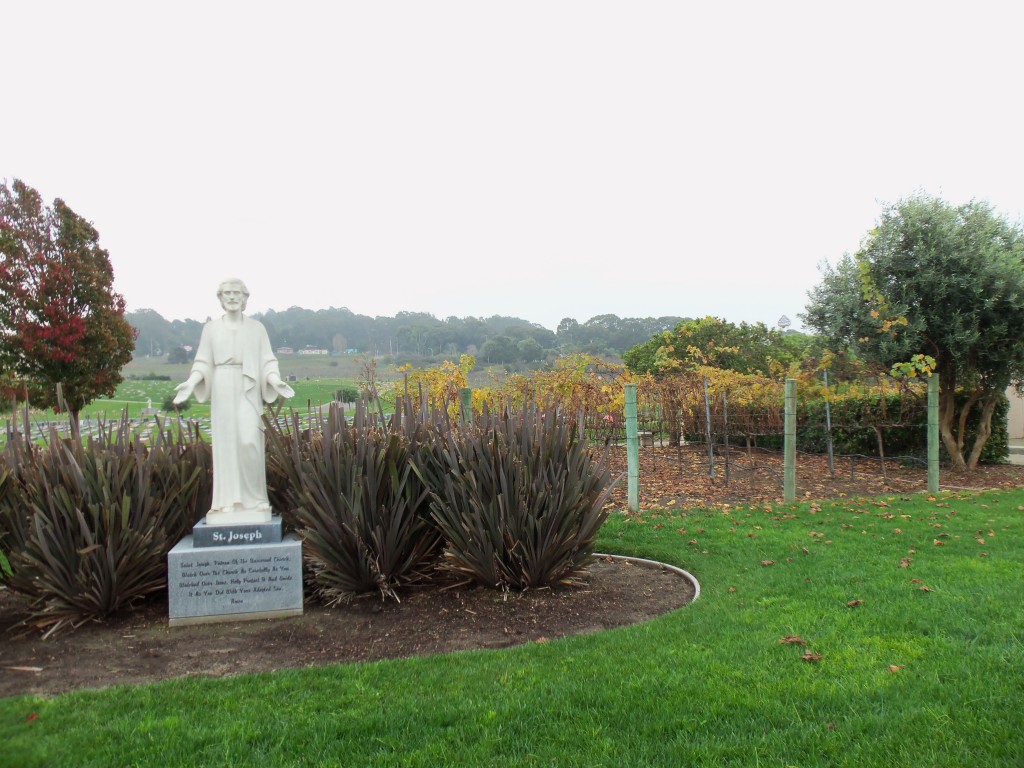
By Albert Pacciorini
A decision several years ago to plant vineyards to beautify vacant cemetery land and produce wine for Mass has proven to be a win-win for the diocese of Oakland, in California, and its parishes and schools.
The plan by Catholic Funeral and Cemetery Services of the diocese took root in 2006 when it was looking for ways to make open grounds more attractive at various cemeteries and reduce maintenance costs. About 16 acres of grapes (6.5ha) have been planted. Production in 2013 totalled about 1,200 cases (12 bottles to a case) of altar wine.
The grapes are processed into wine by a contractor, and the bottled altar wine is offered free to diocesan parishes. About 74 of the diocese’s 84 parishes have sampled the sacramental wine, said Joe Rivello, director of winery operations, and about half the parishes have taken advantage of the offer.
Cemetery wine managers estimate parishes could consume about 865 cases a year. “At an estimated retail cost of $6 a bottle delivered, that is a savings of $52,000 to the parishes of the diocese,” Rivello said.
At St Joan of Arc parish in San Ramon, parish priest Fr Ray Zielezienski estimates the donated wine saves the parish about $2,500 a year.
In a letter to parishes, Bishop Michael Barber SJ, Bishop of Oakland, wrote: “The grapes planted in our cemeteries are clearly now not only part of a beautification project, but, providentially, became a sign of our participation in eternal life, through the celebration of the Eucharist”. Parishes will not only benefit from its quality, the bishop continued, but also financially from the wine donation.
Catholic Cemeteries has also donated wine to parishes and charities to support local fundraising activities, Rivello said. One Knights of Columbus council raised $600 for youth homes, a San Damiano retreat raised $720 at a fundraiser, and the Society of St Vincent de Paul sponsored a wine-tasting benefit as part of its 100th anniversary celebration.
“Grapes are the quintessential California crop,” Rivello said.
Initially, Robert Seelig, Catholic Cemeteries’ executive director, and Tom Richardson, development director, considered the advantages: Grapes require little maintenance and cost about half as much as maintaining a lawn; they have a smaller carbon footprint; the organisation can either make wine or sell the grapes to a vintner; and they are an important symbol of Christianity.
With the advice of Steve Brutocao of Brutocao Cellars in Hopland, Catholic Cemeteries’ first winemaker, chardonnay, primitivo and pinot noir root stock were planted at Holy Sepulchre Cemetery in Hayward; zinfandel and cabernet sauvignon at Holy Cross in Antioch; and merlot, pinot noir and Sangiovese at St Joseph in San Pablo.
“After a few years, the grapes were harvested and sent to Brutocao winery in Hopland for crushing and bottling,” Rivello said. “These first efforts yielded bottles of altar wine and varietals of chardonnay, cabernet and merlot.”
The plan is to create a website and wine club, and sell premium varieties of wine.
“Hopefully, next year, parishioners will be able to buy wines on the Bishop’s Vineyard website,” Rivello said. “But, it is not operational yet. We still have to get licensing and set up the ordering logistics. However, some wine may be purchased at the cathedral gift shop.”
“As to the pricing, we will have to see what the quality of the wine is before we can put a price on them,” he said.
In 2013, Jim Ryan, a wine consultant who has worked for several vineyards in California, joined the operation. Ryan brokered an agreement with Rock Wall Wine Company in Alameda to blend a new altar wine. The firm also produced several premium wines for the Bishop’s Vineyard Wine Club.
None of the grapes used in the wine is purchased, Ryan said. “Every grape in every bottle” comes from cemetery property, he said. – CNS